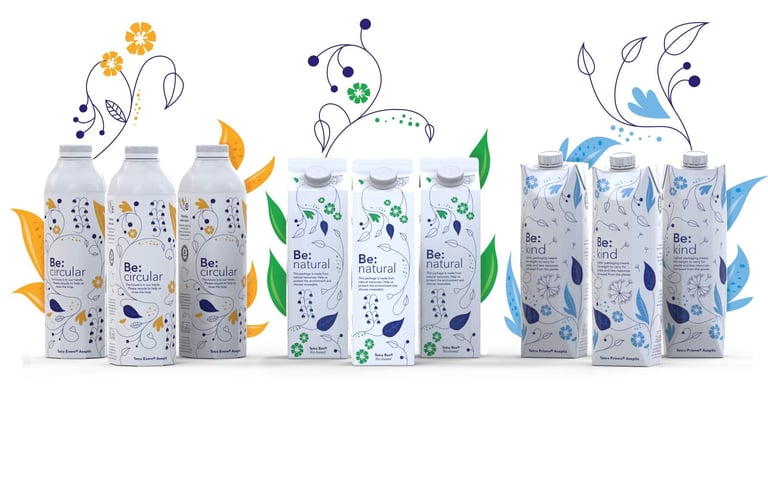

Tetra Pak LEAP
“Emerging brands Ecosystem Pilot Project"
This project took place between May and August 2023
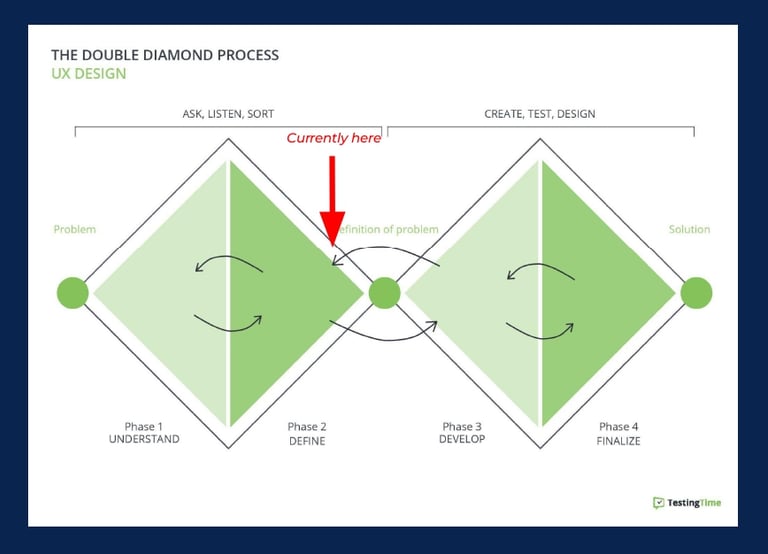

This case study was part of a collaboration project between Tetra Pak (TP), the leading global company in food processing and packaging solutions, with Naked Innovations, a specialized consultancy agency and venture studio focused in the agrifood sector.
My role as part of the Naked Innovation team was to lead the research, so I was involved in the early stages of the project, helping the team to provide crucial information that met our clients' needs, which was also instrumental in the subsequent design of the solution offered.
In the context of the Double Diamond diagram, my involvement spans from the first diamond, where we sought to "Understand" the problem, through to the conclusion of the process in the "Define" stage.
Methodology:
In order to gain a deep understanding of the client's needs and expectations, we organised three remote workshops in which we used carefully crafted artefacts in Mural to achieve active participation. My responsibility extended beyond facilitation to extract valuable insights from each session.
TP LEAP Kick Off:
This session aimed to clarify the purpose of the project, aligning it with the client's expectations and current circumstances to further design the process.Project Analysis Workshop:
This was our first in-depth interaction with the client. The Lead Designer implemented facilitation ideas, incorporating templates designed by me. These templates focused on exploring the client's knowledge of the past, present and future of the company, ensuring a unified understanding and sharing of information.Scoping and design workshop:
This workshop deepened our understanding of the business. We introduced a benchmarking deck to help them visualise not only the existing market landscape, but also their aspirations for the pilot programme. This step was crucial in guiding them towards their desired outcomes.
Project Scan Workshop:
These templates were used to understand the company's current situation, its knowledge on the company's performance and its past and future aspirations.
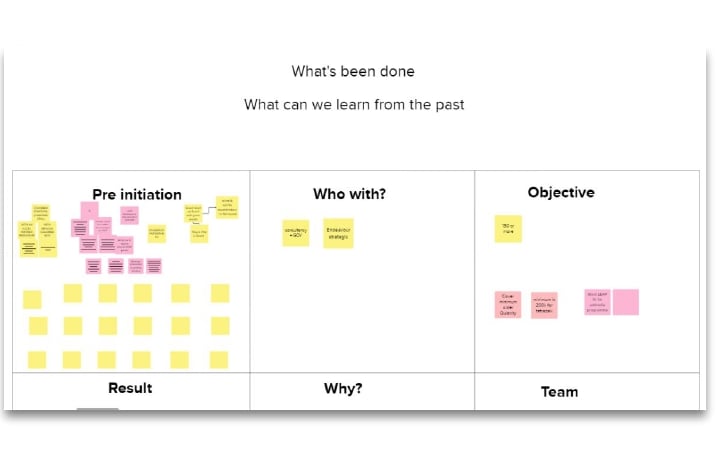

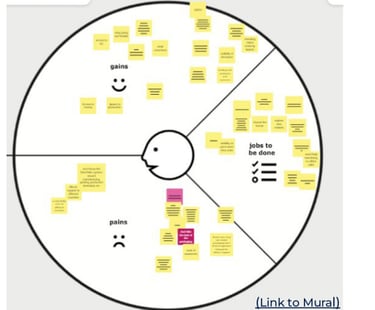

Past. What’s been done &
we can learn
Value Proposition Emerging Brands
These dynamics showed that Tetra Pak aimed to guide emerging brands by addressing market strategies, pricing clarity, sustainability and packaging concerns. The challenge was to familiarise these brands with Tetra Pak's system for manufacturing and related processes.
With these two dynamich, Tetra Pak outlined ambitious growth plans, forecasting a significant increase over the next 1-3 years. In addition, they expressed a strategic focus to incorporate 10% of emerging food technologies in the next 2-5 years.
Within three years, the pilot aims to achieve global recognition and position itself as a leading platform for emerging brands and retailers. The objectives also included leveraging self-sustaining capital for investment, fostering a strong network of investors, facilitating a continuous influx of new players and cultivating long-lasting relationships with emerging companies.
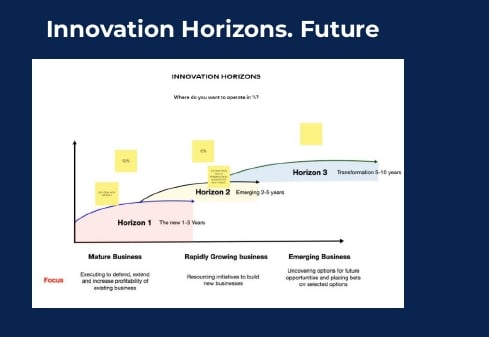



I created a benchmarking research deck, which was shared with Tetra Pak for feedback prior to the workshop.
During the workshop, we incorporated their input and used various frameworks to understand their market position and strategic priorities, with a particular focus on brand value for Tetra Pak's chosen start-ups.
The session provided valuable insights, revealing six recurring themes - Club, Value/Offering, Criteria, Programme, Sustainability and Timeline - that represent their key interests and preferences in order to design the pilot.
Scoping and design workshop:
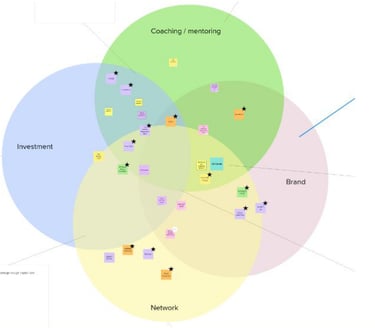

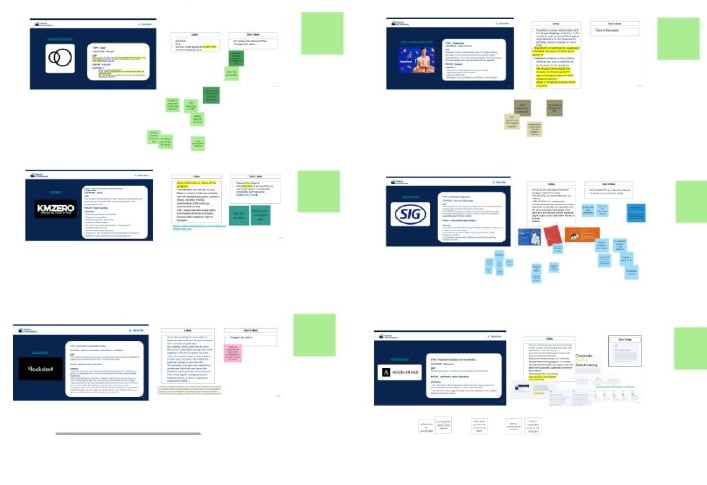

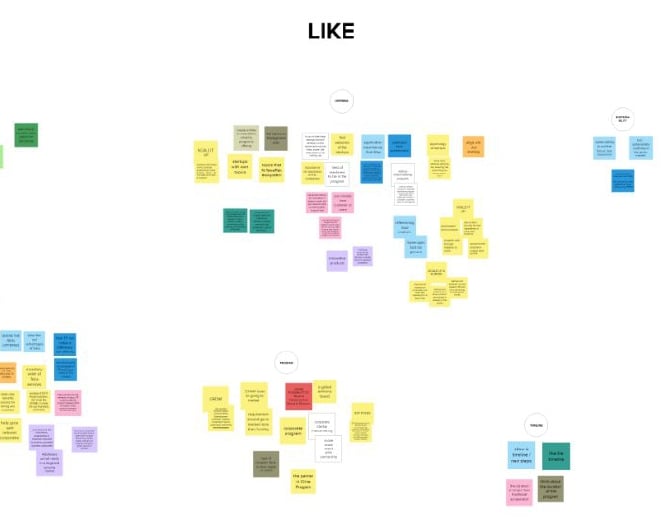

Research steps
Findings were grouped together to identify recurring themes.
Extraction of key findings, capturing Tetra Pak's motivations, desires or frustrations in relation to specific issues.
Use of research and design artefacts to inform analysis.
Interviews with key stakeholders, including emerging brands, co-packers, investors and retailers, ensuring that the programme we were meant to design was tailored to their real needs.
Innovation: Drive for unique product creation.
Speed: Swift response to market demands.
Strategic Partnerships: Seeking suitable co-manufacturers.
Venture Capital: Aspiring for access to capital.
Retail Presence: Motivation for retail connections.
Motivations:
During these workshops we discovered their current challenges and motivations:
Difficulty in securing retailer listings with specific requirements.
Challenges in marketing due to budget constraints.
Funding limitations for launching new products.
Limited access to retailers demanding payment and profit margins.
Limited familiarity with contemporary scaling-up practices impacting growth.
Challenges:
After completing three workshops and analysing their views, we moved on to interviews. We interviewed their key stakeholders - Packagers, Retailers and Emerging Brands - to understand current market trends, industry challenges and opportunities for collaboration. This crucial step aimed to gather an insight into each group's needs, shaping effective strategies for building strong partnerships.
The obtained insights guided the development of tailored solutions for each stakeholder group. An example of this is reflected in the Persona created from the Co-packers group interviews.
Stakeholders Interviews:
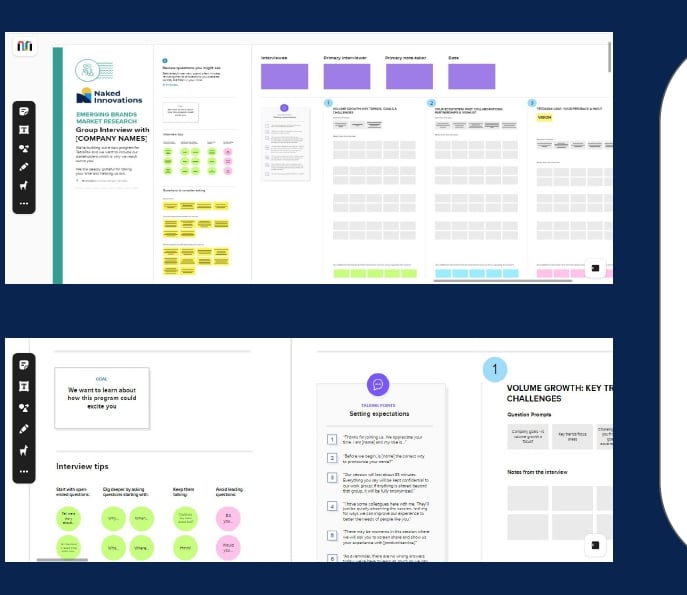

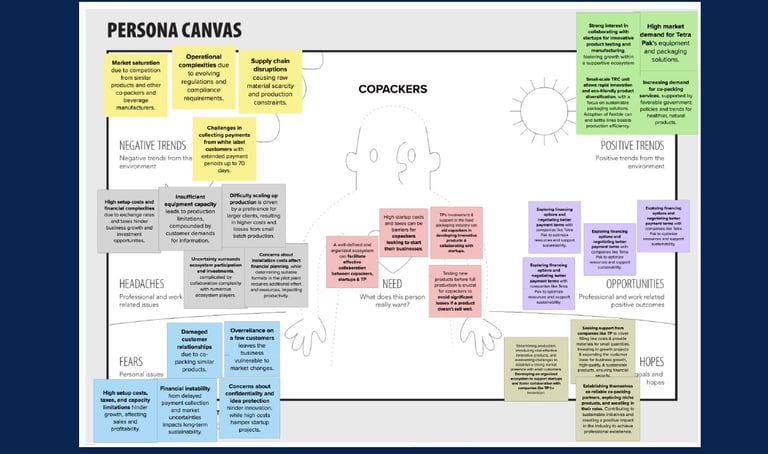

Key Objectives:
Explore the potential of emerging brands
Diversify Tetra Pak's product portfolio
Drive sustainable growth in the industry
The launch of the "Emerging Brands Ecosystem Pilot Project" focused on driving innovation in the food and beverage sector.
By collaborating with emerging brands and expanding Tetra-Pak's offerings, aiming to establish Tetra Pak as a sustainable growth partner in the industry. With a pilot program initially thought to be launched in few countries in EU, our vision was to design a program that would be global and a catalyst for emerging brands worldwide.
The workshops facilitated open and individual feedback, improving communication and understanding of the client's needs.
This solid understanding was instrumental in establishing the blueprint for the successful pilot project.
The insights gained from the workshops shaped the structure of the project, influencing the duration, approach, value proposition and target audience, guiding the next steps of the project, significantly influencing its overall success.
Key learning points:
Revealed a major challenge in information management, despite updates and company workshops. A comprehensive knowledge of past and present initiatives was lacking, raising the question of how to effectively connect dispersed information from its extensive website and newsletters.
A crucial collaboration on alternative plant-based proteins was also highlighted, in line with environmental concerns and EU investments in research and development. Recognised Tetra Pak's strategic positioning for its next pilot, ensuring its relevance in a market influenced by evolving consumer preferences.
